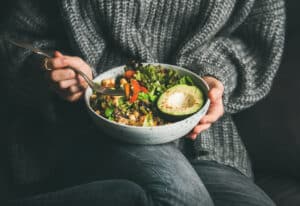Eating mindfully is one of the simplest yet most effective things you can do for your own wellbeing. It is also one of the hardest (it did not come naturally to me), but it really is worth putting the effort in and I will explain why.
How hard is it for you to sit and eat a meal without any distractions? Can you be fully present with yourself and your food without talking, watching, reading or listening to something or someone? If the idea of being alone with your body and your food and nothing else is daunting, then let me tell you why it is so important to develop this life skill.
Why is it so hard to just eat?
Truly being present with ourselves and our food means that we have to acknowledge how we are feeling physically and emotionally; something we rarely do. Because we spend so little time tuning into our bodies and our emotions, there is a backlog of physical and emotional sensations that our bodies need to process. When we take the time to tune in, the backlog feels overwhelming and uncomfortable, so we avoid it or put it off for when we have enough time and space to process our feelings. But we do this so rarely that the simple act of being present while we eat feels unbearable.
Even if you do manage to sit down with your food with no external distractions, your mind may find a way to distract you from yourself. Have you ever tuned in at the end of a meal or snack binge and thought, I don’t even remember eating that? Kind of like when you drive somewhere on autopilot and realise when you arrive that you were barely present the whole time. The problem with eating on autopilot is that your body doesn’t turn on the right physiological mechanisms to digest your food properly.
Eating without connecting to your food and your body takes a toll on your digestion, nutrition, sleep, emotional stability, hormone balance, fertility and energy levels. This is because of your autonomic nervous system (ANS). Your ANS governs bodily functions that happen automatically, like your heart beating, your lungs breathing and your food digesting. It is split into two major branches, your sympathetic nervous system which governs the stress responses of fight, flight and freeze; and your parasympathetic nervous system which governs resting, digesting, reproducing and repairing your bodily tissues. For short I will call the two branches fight or flight (sympathetic) and rest & digest (parasympathetic).
The problem for most people living in modern, urban environments is that our fight or flight responses are constantly being triggered by things that are not actually likely to kill us, but the primitive aspects of our brains don’t know that. So we are running on adrenalin whether we need it or not, and this becomes a habit that is slowly destroying is from the inside. Our bodies were not designed to spend prolonged periods of time in fight or flight mode without the calming effects of rest & digest mode.
When our fight or flight mode is activated we are not fully in rest & digest mode, which means we don’t sleep well and we don’t digest our food well. The parasympathetic nervous system is also what helps us heal and repair damaged tissues, so acute injuries can turn into chronic pain when we don’t spend enough time in rest & digest (and repair) mode.
I’ve also found that some unexplained fertility issues can improve by consistently spending more time in rest & digest (and reproduce) mode. If you are constantly in fight or flight mode your body might decide it is not an optimal time to have a baby because your nervous system is receiving lots of signals that your environment is not safe. It is important to note therefore that time spent on activities (such as eating mindfully) that activate your rest & digest mode consistently can improve your ability to self-heal and become pregnant.
Eating mindfully will also help your body to process and assimilate the nutrients from your food. If you can switch your nervous system to rest & digest mode every time you eat, you will gain more nutritional value from your food, which means you can eat less overall. You will also have less digestive discomfort. If you are primarily eating whilst in fight or flight mode you will have less blood supply to your digestive organs as your nervous system will have diverted resources to your heart and muscles so that you can flee from danger or defend yourself. Your digestive system will not be operating at full capacity, which can ultimately lead to conditions such as irritable bowel syndrome (IBS).
A great way to tell if you are in rest & digest mode is to tune into your body and notice if you can hear or feel your stomach gurgling (the technical term for this is borborygmi). These noises do not necessarily correlate with having just eaten or being hungry, they are more of an indicator of the state of your nervous system. If your intestines are grumbling it is a good sign that you are in rest & digest mode and your body will be able to sleep well, eat well, heal itself and reproduce.
Another sign that you are in rest & digest mode is if you are salivating. This is why it’s great to take a moment before you eat to gaze at your food, stimulating your senses with the colours and aromas. Ideally you should wait until your mouth starts producing extra saliva before you start eating. Once you take your first bite, take a moment to really notice the flavours and textures with your tongue. All of this will kick start your rest & digest mode if it hasn’t fully switched on yet. The key now is to maintain this level of presence and mindfulness with your food and your body for the whole time you are eating, and keep it going while your body is fully digesting afterwards. If you can do this every time you eat, you will be giving your body an unbelievable gift of wellness. So many of our modern ailments can be traced back to eating in a rush. When you understand the physiology of stress and how it affects our digestion, sleep and self-repairing functions it makes it a lot easier to prioritise eating slowly and mindfully.
This article is an excerpt from Annie McCasland-Pexton’s forthcoming book on self-care, which will be published in November 2017. If you would like to be notified when the book is released please sign up here.



